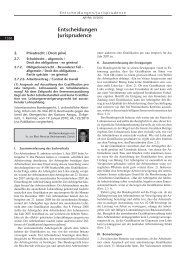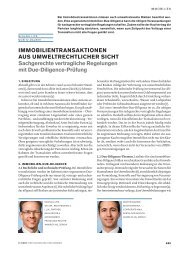ASAB 29-3 Thomas Rohner Michael Lazopoulos - Pestalozzi ...
ASAB 29-3 Thomas Rohner Michael Lazopoulos - Pestalozzi ...
ASAB 29-3 Thomas Rohner Michael Lazopoulos - Pestalozzi ...
Create successful ePaper yourself
Turn your PDF publications into a flip-book with our unique Google optimized e-Paper software.
T. ROHNER & M. LAZOPOULOS, RESPONDENT’S REFUSAL TO PAY ITS SHARE OF THE<br />
ADVANCE ON COSTS<br />
way be seen as an acceptance or endorsement by the ICC of the nonpayment<br />
by a party of its share of the costs.” 12<br />
By signing the arbitration agreement, each party undertakes to ensure<br />
that any subsequent arbitration proceeds as it should. 13 This undertaking<br />
generally forms a contractual obligation between the parties which is<br />
enforceable. 14 The payment of advances is one of the prerequisites to having<br />
disputes adjudicated by an arbitral tribunal. Legal scholars therefore conclude<br />
that the arbitration agreement imposes equal contractual obligations on both<br />
parties to pay the required advances to allow the proceedings to go forward. 15<br />
In international arbitration, it is common practice for each party to pay<br />
an equal share of the advance on costs, unless the parties agree otherwise.<br />
This is reflected in most institutional arbitration rules. 16 Arbitration rules<br />
form “by reference” an integral part of the arbitration agreement and are to be<br />
treated like any other terms of the contract. 17 Accordingly, the respondent<br />
who fails to pay its respective share of the advance on costs is in breach of its<br />
contractual obligation under the arbitration agreement towards the claimant<br />
(and towards any other party to the arbitration agreement, if any 18 ), who is<br />
forced to substitute the respondent’s share of the advance payment to have<br />
the dispute adjudicated by the arbitral tribunal. 19<br />
12<br />
13<br />
14<br />
15<br />
16<br />
17<br />
18<br />
19<br />
Note from the Secretariat of the International Court of Arbitration to all Parties, for information<br />
concerning the Application of the Schedule of Conciliation and Arbitration Costs of 1 January 1993,<br />
publ. in: The ICC ICArb. Bull. (1993), at 27.<br />
IBRAHIM FADLALLAH, Payment of the Advance to Cover Costs in ICC Arbitration: The Parties’<br />
Reciprocal Obligations, in: ICC ICArb. Bull. 14 (2003), at 55; PHILIPP SIEBER, Respondent’s refusal<br />
to pay the advance on costs: The contractual and the procedural approach, in: SAA Vol. 1: Selected<br />
Papers on International Arbitration, Berne (2011), at 65.<br />
PHILIPP SIEBER, supra note 13, at 65.<br />
FRANZ SCHWARZ/CHRISTIAN KONRAD, The Vienna Rules, A Commentary on International<br />
Arbitration in Austria, Austin, Boston et al. (2009), at 741; MARCO STACHER, in: Swiss Rules of<br />
International Arbitration, Tobias Zuberbühler/Christoph Müller/Philipp Habegger (eds.),<br />
Zurich/Basel/Genf (2005), article 41 note 20.<br />
See, e.g., article 41(1) Swiss Rules; article 30(3) ICC Rules; article 70(a) WIPO Rules; article 45(3)<br />
SCC Rules; article 34(2) VIAC Rules; article 25 DIS Rules; article 26(2) SIAC Rules; article 42(2)<br />
ACICA Rules.<br />
MATTHEW SECOMB, supra note 4, at 62; see also partial award dated 17 June 2002 in ICC Case 11330<br />
(unreported), cited in: MATTHEW SECOMB, supra note 4, at 63; ANNA-MARIA TAMMINEN, The<br />
Obligation to Pay the Advance on Costs under the Vienna Rules and Austrian Law, in: Austrian<br />
Arbitration Yearbook 2009, Vienna 2009, at 284.<br />
For reasons of simplification, this article deals with two-party proceedings only. The same<br />
considerations, however, apply mutatis mutandis in multi-party proceedings, where, for instance, the<br />
second respondent has to pay the share of the advance on costs of the first respondent.<br />
LAURENCE CRAIG/WILLIAM PARK/JAN PAULSSON, supra note 7, at 267; FRANZ SCHWARZ/CHRISTIAN<br />
KONRAD, supra note 15, at 743 et seq.; IBRAHIM FADLALLAH, supra note 13, at 55 note 7; PIERRE<br />
KARRER, Naives Sparen birgt Gefahren – Kostenfragen aus Sicht der Parteien und des<br />
Schiedsgerichts, in: SchiedsVZ (2006), at 116; ALEXANDER NERZ, Vor- und Nachteile eines<br />
Schiedsverfahrens nach der Schiedsgerichtsordnung der Internationalen Handelskammer, in: Recht<br />
<strong>29</strong> ASA BULLETIN 3/2011 (SEPTEMBER) 553




